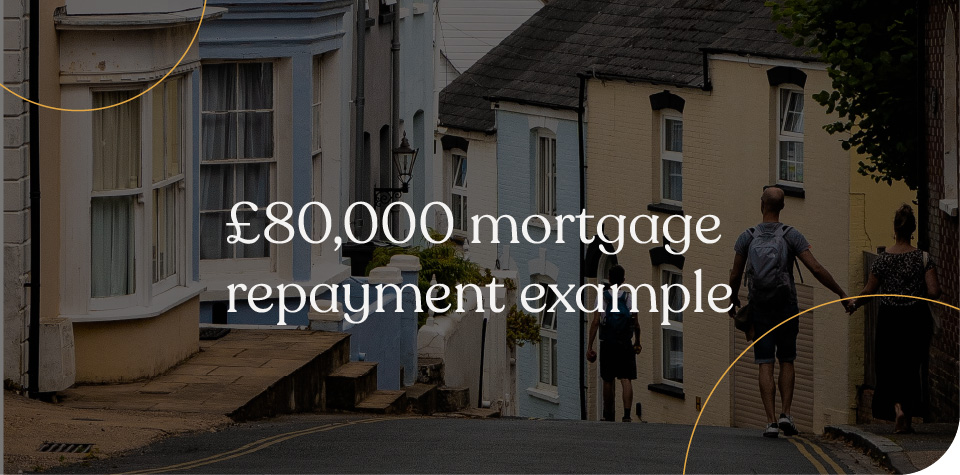
£80,000 mortgage repayment example
Getting a mortgage for £80,000 is easy if you have good credit as this amount is seen as a small amount in the mortgage lending arena.
The mortgage repayment calculator will give you an estimated guide on the monthly payments for a £80,000 mortgage:
You can reach us by calling or using the enquiry form to ask our expert mortgage lenders any questions about the figures on this page.
All information is free of charge and without obligation. All of our mortgage brokers are regulated by the financial conduct authority.
We assume you are looking to purchase, not re-mortgage. For example, you may have a 25% deposit and require a term of 25 years.
However, you can easily alter this information to fit your needs. Any alterations will automatically be calculated.
Example calculations of repayments on an £80,000 mortgage
Monthly mortgage payments for an £80,000 mortgage will vary depending on your interest rates and how long you keep the mortgage deal.
FAQS on £80,000 mortgages
Your income is the most important factor in determining which mortgage deal you get.
You can typically borrow no more than 4.5 times your annual income.
If you make £60,000 per year, then the maximum amount you can borrow is £270,000. Your lender will be less likely to lend you more than you can afford.
You may also be affected by these factors when getting any mortgage, not just an £80,000 mortgage:
The idea is to keep your payments affordable. You run the risk of being unable to pay your monthly repayments if you add a large mortgage to credit card debt, a loan for a car, or other expenses. Your lender may lose money if your mortgage is not paid.
We are expert mortgage brokers
We have access to over 200+ lenders in the UK to get you the best rates
Get your Quote
Will your credit history affect your mortgage?
Credit history is how lenders will look at your past debts. Lenders will consider you riskier if you have had difficulty meeting your repayments. Lenders may ask for a higher deposit or charge you more interest.
Your age – Most mortgages expire when you reach retirement age. Most lenders want their money back before you reach retirement age because your income will be less when you retire.
Lenders will typically offer shorter terms as you age, so your monthly payments will likely increase. These larger payments will require you to prove that you can afford them.
However, it is possible to obtain a mortgage once you have retired, provided you can show that your income from investments or pension is sufficient to pay the monthly repayments.
Alternatives to consider if you struggle to get an £80,000 mortgage
A guarantor mortgage is where someone you trust agrees to pay your mortgage if it becomes impossible to afford.
A lifetime mortgage or equity release mortgage allows you to borrow money against your home’s value without making any repayments. You must have paid off all or most of your mortgage to qualify. To make the lender’s money back, they will either sell your house or transfer it to someone who can care for you long-term.
A home reversion scheme means your home is sold to an equity release company. The company will then sell your home. You can continue to live there until you are in long-term care, or die.
Your monthly repayments for a repayment mortgage are split into two parts. The first part of your monthly repayment pays the principal amount borrowed and the second part pays the interest.
We are expert mortgage brokers
We have access to over 200+ lenders in the UK to get you the best rates
Get your Quote
Two benefits come with repayment mortgages:
First, your loan-to-value ratio – the amount of money you borrowed relative to the value of your home – will decrease over the term. This is because you are paying back the money you borrowed in order to purchase your property.
Second, in the end, all your debts and interest will be paid off, and you will own your home.
However, you will pay more for your loan and interest than you borrowed because you pay only the interest on the mortgage; interest-only mortgages are less expensive.
The downside is that your repayments will not cover the amount borrowed. You will need to have enough cash saved to pay off your mortgage when it ends. To pay the debt, you may have to sell your property.
Repayment mortgages are the most common type of residential mortgage. These mortgages are mortgages that you take on your home. Mortgages for buy-to-let are typically interest-only.
The best mortgage deal for you is one that allows you to borrow as much money as you need and has the lowest interest rate. However, price doesn’t necessarily mean everything. Depending on your situation, a slightly more expensive deal may be better than the cheapest.
What to look at when comparing £80,000 mortgages from UK lenders
The interest rates – The single most important factor that will affect the cost of your mortgage is the interest rate. This is because interest will be charged each month as long as your mortgage remains active.
Lenders advertise their annual percentage rate (APR) to make it easy for customers to compare. The Financial Conduct Authority rules state that 51% of customers must receive this rate or a lower rate in order for a lender to advertise it as representative or typical.
However, your individual circumstances will determine the interest rate that you get. It is not guaranteed that you will get the average APR (or a lower) rate.
It also matters whether you choose a fixed- or variable-rate mortgage. Variable-rate mortgages have lower interest rates than fixed-rate mortgages. Your monthly payment can’t be changed because your rate is fixed for a specific period.
A variable interest rate is not always going to go up. It could even go down. However, you cannot be certain.
Benefits and fees – The interest rate is the most important factor in the cost of your mortgage. However, fees and charges can add up. A mortgage with a high-interest rate and lower fees might be cheaper than one that has a low rate and higher fees.
Cashback and other perks, such as a discount on home insurance, can help to make up some of the fees.
This comparison tool will give you a complete picture of the cost of your mortgage, including interest, fees and any benefits such as cashback, during your initial mortgage period. More information is available about mortgage fees.
Variable-rate – This is the default rate that your lender will charge you after the initial period ends on your mortgage.
Remember that the standard variable interest rate is often much higher than the rate you paid during your initial mortgage term. This will mean that your monthly repayments will likely go up quite a bit. However, a high standard rate variable rate is not necessarily a deal-breaker. After your initial period ends, you might consider remortgaging.
The term of a mortgage – Most mortgages have a term of 25 years. However, depending on your financial situation and age, you may be able to take a shorter or longer mortgage.
While monthly payments are lower for longer mortgages, you will pay more interest. Mortgages with shorter terms will have higher monthly payments, but you’ll pay more interest. This is because the loan is spread over fewer years. However, overall you will pay less interest.
The fine print – Although cost is important, it’s important to consider how your mortgage will fit into your long-term goals.
You might consider going back to school or starting your own business. You might be able to take a holiday or underpay your mortgage.
You might also consider asking the lender about their overpayment or early repayment policies if you would like to overpay.
It might be worth paying a little more for a mortgage that gives you more flexibility.
Take a look at other mortgage repayment examples:
- £20,000 mortgage repayments example
- £30,000 mortgage repayments example
- £40,000 mortgage repayments example
- £50,000 mortgage repayments example
- £60,000 mortgage repayments example
- £70,000 mortgage repayments example
- £90,000 mortgage repayments example
- £100,000 mortgage repayments example
We can get you approved for an £80,000 mortgage in just 24 hours online
We will help you determine which mortgage is most likely to be approved, and we’ll do all of the work so that you don’t have to.
Start your application online below, and we will help you get the best rates. Our advice is free, so start now below:

